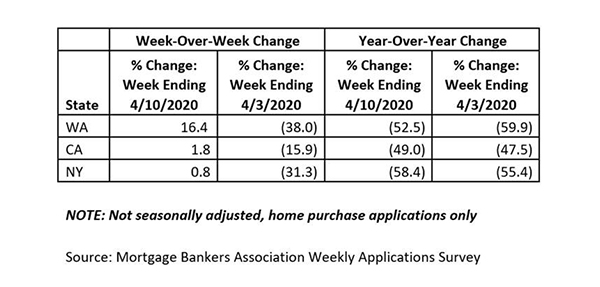
Mortgage Applications Up as Interest Rates Hit Record Low in MBA Weekly Survey

Mortgage applications increased from one week earlier as the 30-year fixed interest rate fell to the lowest level in survey history, the Mortgage Bankers Association reported this morning in its Weekly Mortgage Applications Survey for the week ending April 10.
The Market Composite Index increased by 7.3 percent on a seasonally adjusted basis from one week earlier. On an unadjusted basis, the Index increased by 7 percent compared to the previous week.
The unadjusted Refinance Index increased by 10 percent from the previous week and was 192 percent higher than the same week one year ago. The refinance share of mortgage activity increased to 76.2 percent of total applications from 74.2 percent the previous week.
The seasonally adjusted Purchase Index decreased by 2 percent from one week earlier. The unadjusted Purchase Index decreased by 1 percent compared to the previous week and was 35 percent lower than the same week one year ago.
Looking at the impact at the state level, here are results showing the non-seasonally adjusted, week over week percent change in the number of purchase applications from Washington, California and New York:

The FHA share of total applications decreased to 9.5 percent from 10.6 percent the week prior. The VA share of total applications remained unchanged from 14.3 percent the week prior. The USDA share of total applications remained unchanged from 0.4 percent the week prior.
“The 30-year fixed mortgage rate decreased last week to the lowest level in MBA’s survey at 3.45 percent,” said Joel Kan, MBA Associate Vice President of Economic and Industry Forecasting. “The decline in rates – despite Treasury yields rising – is a sign that the mortgage-backed securities market is stabilizing and lenders are successfully working through their lending pipelines. Refinance activity has experienced a volatile four-week period, but did increase 10 percent last week. Refinancing will continue to be beneficial for the many borrowers able to lower their monthly payments during this time of economic distress.”
Kan noted purchase applications decreased less than 2 percent last week – the fifth straight weekly decline. “Compared to the first week of March, the purchase index was down around 35 percent, as the economic downturn and nationwide mitigation practices to slow the spread of COVID-19 have disrupted the spring homebuying season,” he said. “The purchase market is still expected to rebound, as long as the public health measures to reduce the pandemic’s spread are successful and result in a broader recovery.”
MBA reported the average contract interest rate for 30-year fixed-rate mortgages with conforming loan balances ($510,400 or less) decreased to 3.45 percent from 3.49 percent, with points increasing to 0.29 from 0.28 (including origination fee) for 80 percent loan-to-value ratio loans. The effective rate decreased from last week.
The average contract interest rate for 30-year fixed-rate mortgages with jumbo loan balances (greater than $510,400) decreased to 3.80 percent from 3.87 percent, with points decreasing to 0.23 from 0.26 (including origination fee) for 80 percent LTV loans. The effective rate decreased from last week.
The average contract interest rate for 30-year fixed-rate mortgages backed by FHA decreased to 3.45 percent from 3.54 percent, with points unchanged at 0.19 (including origination fee) for 80 percent LTV loans. The effective rate decreased from last week.
The average contract interest rate for 15-year fixed-rate mortgages remained unchanged at 3.04 percent, with points increasing to 0.27 from 0.25 (including origination fee) for 80 percent LTV loans. The effective rate increased from last week.
The average contract interest rate for 5/1 adjustable-rate mortgages decreased to 3.34 percent from 3.39 percent, with points increasing to 0.35 from -0.02 (including origination fee) for 80 percent LTV loans. The effective rate increased from last week.
The ARM share of activity decreased to 2.7 percent of total applications.
The survey covers more than 75 percent of all U.S. retail and consumer direct residential mortgage applications and has been conducted weekly since 1990. Respondents include mortgage bankers, commercial banks and thrifts.
